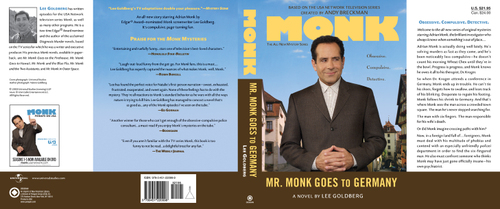Lee Rae

Maddie and I arrived at the CBS lot in Studio City at 5:30am for the 6 a.m. picket…and we were the only ones there, if you don’t count the news crew from KABC. The newsbabe asked me if I wanted to be interviewed for her live report and I declined. I figured I could only get myself in trouble.
Other writers started showing up around 6 and picket signs were delivered at about 6:15. We walked for three hours straight, back-and-forth in fr0nt of the CBS studio gates. I chatted with a few folks for a bit, but mostly Maddie and I just walked in circles and talked amongst ourselves. She thought the writers we were way too polite to people coming and going to the studio and that we should have been causing more of a ruckus. There was one actor who joined the picket line — Julie Bowen from BOSTON LEGAL (that’s her in the striped shirt holding the SAG in Solidarity sign behind my daughter) but that was it for celebrity sightings. 
We left around 9:30 and headed straight to Subway for an unhealthy breakfast. I must have walked several miles today. My feet and back are killing me, but I figure that picketing is going to be a great way for me to lose some weight and help my fellow writers at the same time.
I’ll be back on the line tomorrow.
UPDATE: You can see Maddie and I picketing on KABC.
Heading to the Picket Line
My jet lag is paying off. I was up at 4 am, wide awake, so I will be on the picket like at CBS at 6 a.m. with my daughter. I am bringing my Blackberry, so maybe I will post here from the front-lines, so-to-speak.
Struck by the Strike
It has been interesting viewing the strike from across the Atlantic. For the last week, I have been keeping up on things from Munich by reading the International Herald-Tribune, USA Today, and whatever British newspapers I’ve stumbled across. The contrast between how the British press is covering the walk-out and our U.S. news media is, well, striking.
The British press, which has no pretense of objectivity, appears to be solidly behind the writers. More than one article portrayed our demands as reasonable and the AMPTP’s reaction as greedy and bewildering.
But the U.S. press, which does pride itself on objectivity, seems to be siding with the networks and studios. Virtually article mentions how highly paid some screenwriters are, or makes some snide aside about strikers arriving in their BMWs and Mercedes or going from the picket lines to their Malibu beach homes. An article in the Herald Tribune even portrayed striking writers as espresso-sipping dandies wearing "arty sunglasses" and colorful scarves. It’s obvious that more than a few print journalists suffer from an inferiority complex and are jealous of screenwriters.
On top of that, trade publications like Variety and newspapers like the Los Angeles Times depend heavily on studio and network advertising revenue, so it’s hardly a surprise that screenwriters aren’t getting a fair shake. L.A. is an industry town, and it isn’t screenwriters who are keeping the lights on at the Hollywood Reporter.
I did get a kick out of the article in Variety a week or so back, where their editors whined that the WGA refused to be baited by each and every negative comment from the AMPTP. They warned that we were going to be "swift-boated" if we didn’t respond whenever one of their so-called reporters, who don’t know how to write without being spoon-fed a press release, asked for a statement from the Guild. I’m proud that our leaders are, for the most part, taking the high road when it comes to responding to the baiting or in characterizing the state of negotiations.
What has also been interesting to me is the feedback I have been getting from German writers, producers, studio execs and network execs regarding the strike. Much to my surprise, they all seemed to be solidly behind the writers. Why was I surprised? Because writers there don’t have a guild or a union and don’t enjoy the protections, creative writers, standard pay, and other benefits that come from having a strictly-enforced, Minimum Basic Agreement. They also don’t have the financial benefit of residuals (unless they work for the state-owned networks, where they do get some rerun money). I kind of expected them to resent us. But even more surprising to me was the supportive comments I heard from studio execs, most of whom provide shows to the networks on a work-for-hire basis and don’t share in any of the revenues. Considering how immensely popular U.S. shows are in Europe, the execs were shocked that writers are only getting a barely measureable percentage of the windfall profits.
Me, too.
I got home last night. I will be walking the picket line tomorrow.
Why We Are Striking
Here’s a short video that explains very clearly one of the big reasons why the WGA is on strike.
I strongly support the Guild, but I was angry when I learned that we’d pulled the demand to double our DVD residuals off the table. I am hoping that doesn’t mean that the WGA doesn’t intend to seek a meaningful increase of our current rate (which is about 4 cents per DVD).
The Flight from Hell on Air India
I flew to Germany on Halloween night and, perhaps fittingly, it was a nightmare. Never, ever, EVER fly on Air India. When I got on the plane, the first thing I saw were the torn carpets. Not a good sign. When I got into business class, the first thing I saw were two broken seats. Again, not a good sign.
The overhead luggage bins were full of dirt and crumbs. The walls were stained and, in many places, held together with masking tape. The seats were torn and stained. The two big televisions hanging from the ceiling were cracked and held together with duct tape. My assigned seat turned out to be broken, so they moved me to another one.I thought about running out of the plane but they’d already sealed the doors and my luggage was in the hold.
I settled in for the long haul. The individual entertainment units are broken, so you have to watch movies on the two TV’s hanging from the ceiling, one of which shows everything in yellow. If Bollywood musicals are your thing, you’ll love Air India. Luckily, I had my video iPod and it was full of shows to watch.
The snacks and meals are Indian, which is to be expected, but your silverware comes wrapped in a dirty napkin, which is not. I had to request a clean napkin. Amazingly, they had one.
Midway through the flight, my seat collapsed on to the woman behind me. It went completely flat, smacking into her lap. I climbed out of my seat. I tried to lift the seat, but it just fell back onto the poor passenger. The stewardess came over to help…and kept pressing the volume control button on my armrest. Clearly, she had no idea how the seats worked. But we finally managed to get the seat up and folded completely forward (that’s how broken it was). I was moved to yet another seat…my third one of the flight.
I asked the stewardess why they don’t repair the seats…she said it’s because the plane is so old, they don’t have replacement parts. It made me wonder what condition the rest of the plane was in…particular the parts that make the damn thing fly.
We landed in Frankfurt (and my old seat smacked into the poor passenger again) and then I switched over to a Lufthansa flight to Munich. As soon as I got on the clean, beautiful, new plane…my stomach started doing somersaults. The instant we were at cruising altitude I ran into the restroom and stayed there for the rest of the flight. It was a much better seat than I had on Air India…the airline that had poisoned me. I spent my first night in Munich in the bathroom of my wonderful hotel.
Aside from the travel hell, the rest of my trip has been great. I had the day to myself on Friday to explore Munich. I have been here many times before, but usually only for the day…and this was the first time I’ve visited when it wasn’t pouring rain or snowing. It was the first time i’d seen the city in the sunshine, thought it was still very cold out (at least for this Southern Californian).
I’ve been consulting with the head writer, producers, and network execs who are working on a new show. I’ve been helping them to find and refine their franchise by teaching them about the different kinds of conflict, the four-act structure and how to use all of that to generate stories that could only be told on their series. I’m essentially teaching an advanced TV writing class and it’s been a lot of fun. Today the writers join us and I will begin walking them all through how a writer’s room is run…and the relationship between writers, the studio and the network (at least how it is in the U.S.)
The only downside to this trip is that I haven’t been able to lick my jet lag. I fall asleep around 9:30-10 pm each night and wake up at 3:30-4am each morning. Hopefully that will pass in another day or two…
I’m Boldly Going
I am heading to Munich this afternoon for ten days to do some consulting for one of the German TV networks, so I may not be posting very often until I return. I’ve just figured out how to update my blog using my Crackberry, so you may be seeing some posts with a Blackberry tag on them. Forgive me if they are awkwardly formatted or typo-ridden.





